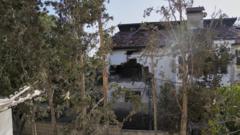Human metapneumovirus (HMPV) cases are climbing in China, particularly in younger populations, amidst social media worries of a pandemic resurgence. Public health experts clarify that while HMPV can pose risks to vulnerable individuals, it is not comparable to Covid-19, emphasizing historical familiarity with the virus and outlining preventative measures.
Surge in HMPV Cases in China: What You Need to Know

Surge in HMPV Cases in China: What You Need to Know
Beijing reports a rise in HMPV, mainly among children, raising concerns about respiratory health as seasonal trends unfold.
In recent weeks, Beijing has reported a notable increase in cases of human metapneumovirus (HMPV), especially among children, a situation attributed to typical seasonal patterns. This surge has led to alarm among social media users and fears reminiscent of the Covid-19 pandemic era. However, experts have clarified that HMPV is distinct from Covid-19, as it has circulated globally for many years, with many children experiencing infection by age five.
HMPV typically leads to mild upper respiratory infections similar to the flu, first identified in the Netherlands in 2001. The virus spreads through direct person-to-person contact or via surfaces contaminated with the virus. Symptoms often include cough, fever, and nasal congestion. While most people experience mild symptoms, young children and those with compromised immune systems, like older adults or cancer patients, may face more severe outcomes. Dr. Hsu Li Yang, an infectious diseases physician, indicates that a notable subset of these at-risk populations could develop serious lung complications and may require hospitalization.
The rise in HMPV cases in China aligns with winter months where cold weather promotes the virus's survival and transmission. Epidemiologists observe that an increase in HMPV is also seen in other northern hemisphere nations, including the US and UK, suggesting a broader seasonal trend. Jacqueline Stephens, an epidemiologist, points out that while the spike is concerning, it is likely part of a typical winter pattern rather than a new health crisis.
Public health experts further alleviate fears of a HMPV pandemic akin to Covid-19 by noting that pandemics usually arise from novel pathogens. HMPV has characterized itself as a well-known virus with a degree of immunity already established in the population. Medical professionals support continued vigilance through standard health practices, including wearing masks in crowded places and prioritizing hand hygiene, while also advising at-risk individuals to avoid crowded environments.
In summary, while HMPV cases are indeed rising in China, experts encourage a factual understanding of the virus's nature and behaviors, reassuring the public that this should not incite the same alarm that surrounded Covid-19.





















